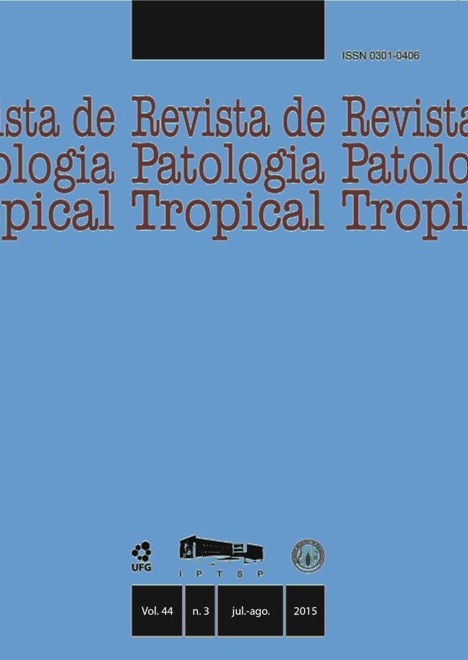REATIVAÇÃO DE LEISHMANIOSE DURANTE TRATAMENTO DE HEPATITE B CRÔNICA COM ALFAINTERFERONA 2B
DOI:
https://doi.org/10.5216/rpt.v44i3.38021Palavras-chave:
Leishmaniose, hepatite B crônica, alfainterferona.Resumo
Descreve-se aqui um caso de reativação de leishmaniose cutaneomucosa durante o tratamento com alfainterferona 2b (IFN) para hepatite B crônica (HBV). Relato do caso: Paciente masculino, 52 anos, natural da Bahia, procedente de São Paulo onde vivia há 30 anos, encaminhado por HBV. Na história epidemiológica, referiu-se a uma viagem há cinco anos para Porto Seguro-BA, sem apresentar outros fatores de risco. No exame físico para admissão, não havia evidências de doença hepática crônica. Sorologias pré-tratamento: HBsAg e HBeAg positivos, biópsia A0F0 (Metavir). Foi submetido a tratamento com IFN 5 milhões de UI/dia por 24 semanas. No final, apresentava-se HBV DNA detectável, sem soroconversão de HBeAg, porém evoluiu no quarto mês de tratamento com perda ponderal de 10 kg, astenia, sinais e sintomas de sinusite sem melhora clínica após antibioticoterapia. Foi encaminhado para a otorrinolaringologia com rouquidão persistente, destruição de septo nasal, com áreas de crostas, necrose local, alargamento nasal e lesão em palato mole, cuja biópsia mostrou processo inflamatório granulomatoso com necrose caseosa, sugestivo de leishmaniose. Sorologia para leishmaniose IgG 1/80 (IFI) e intradermorreação de Montenegro de 30 mm. Indicado antimoniato de meglumina IV por 30 dias, obteve melhora da rouquidão e das lesões de palato. Conclusão: O quadro clínico sugere reativação da leishmaniose induzida pelo IFN. Acredita-se que este seja o primeiro relato na literatura de reativação de leishmaniose muco-cutânea por uso de IFN, semelhantemente ao que ocorre com a tuberculose. Screening para leishmaniose deve ser realizado em paciente de região endêmica no pré-tratamento com IFN diante da possibilidade de reativação de infecção latenteDownloads
Downloads
Publicado
Como Citar
Edição
Seção
Licença
The manuscript submission must be accompanied by a letter signed by all authors stating their full name and email address, confirming that the manuscript or part of it has not been published or is under consideration for publication elsewhere, and agreeing to transfer copyright in all media and formats for Journal of Tropical Pathology.

